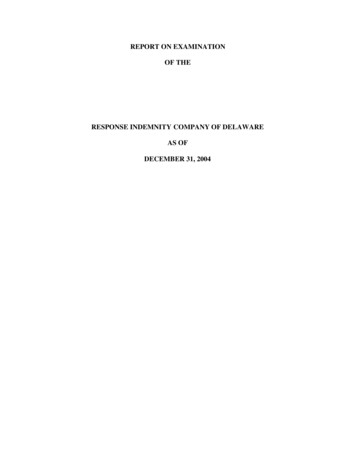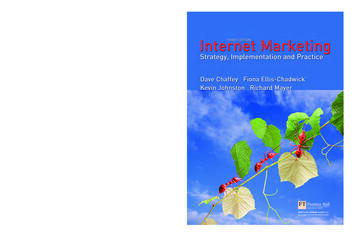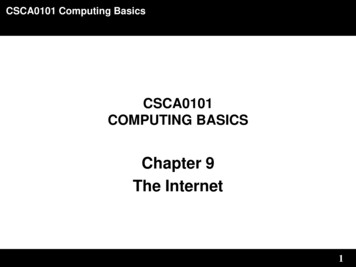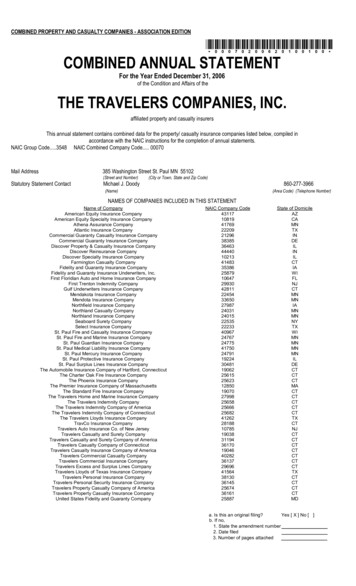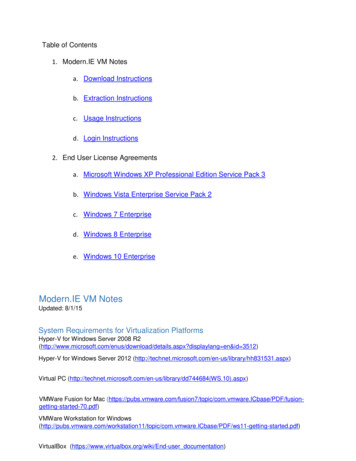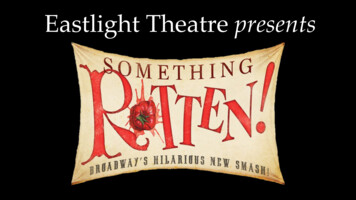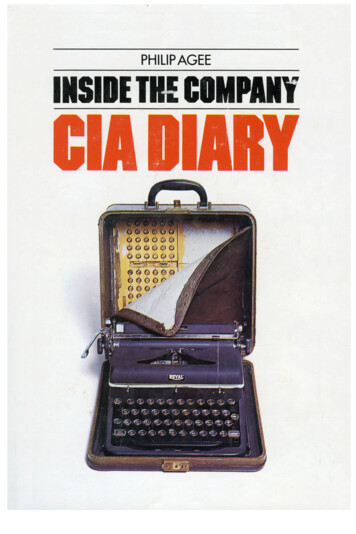
Transcription
INSIDE THE COMPANY: CIA DIARY
Inside Cover:Excerpted from a page-one pre-publication review in the Washington Post"Book World"When Victor Marchetti's The CIA and the Cult of Intelligence was publishedit contained intriguing blanks where material deemed too sensitive by the CIAhad been.There are no blanks in Philip Agee's Inside the Company: CIA Diary. Thisdensely detailed expose names every CIA officer, every agent, every operationthat Agee encountered during 12 years with "The Company" in Ecuador,Uruguay, Mexico and Washington.Among CIA agents or [contacts] Agee lists high ranking political leaders ofseveral Latin American countries, U.S. and Latin American labor leaders, rankingCommunity Party members, and scores of other politicians, high military andpolice officials and journalists.After a stint as an Air Force officer (for cover) and CIA training, Ageearrived in Quito, Ecuador in late 1960. During the glory years of the Alliance forProgress and the New Frontier, he fought the holy war against communism bybribing politicians and journalists, forging documents, tapping telephones, andreading other people's mail.But it was a faraway event which seems to have disturbed him more. LyndonJohnson's invasion of the Dominican Republic in 1965 was an overreaction Ageecouldn't accept. In 1968, he resigned with the conviction that he had become a"servant of the capitalism I rejected" as a university student—"one of its secretpolicemen."Agee decided to write this reconstructed diary to tell everything he knew. Hespent four years writing the book in Europe, making research trips and dodgingthe CIA. At one point he lived on money advanced by a woman he believes wasworking for the CIA and trying to gain his confidence.Until recently, former CIA Director Richard Helm's plea that "You've just gotto trust us. We are honorable men" was enough. With the revelations of domesticspying, it no longer is.In this book Agee has provided the most complete description yet of what theCIA does abroad. In entry after numbing entry, U.S. foreign policy in LatinAmerica is pictured as a web of deceit, hypocrisy and corruption. Now that we
can no longer plead ignorance of the webs our spiders spin, will be continue totolerate CIA activities abroad?—Patrick Breslin The Washington PostCover photograph by Dennis Rolfe shows a typewriter and bugged caseplanted on the author presumably by the CIA.Stonehill Publishing CompanyDistributed by George Braziller, Inc.
Philip Agee, who was a CIA operations officer for twelve years, now lives inEngland.
"More than an expose, a unique chronicle . the most complete descriptionyet of what the CIA does abroad. In entry after numbing entry, U.S. foreignpolicy is pictured as a web of deceit, hypocrisy and corruption."—TheWashington Post"Unlike Victor Marchetti, who was so high in the CIA that many of hisnotions of what goes on at the operations level are downright absurd, Philip Ageewas there. He has first-hand experience as a spy-handler . as complete anaccount of spy work as is likely to be published anywhere . presented withdeadly accuracy."—Miles Copeland, former CIA agent, in The London Observer"The workings of the world's most powerful secret police force—the CIA—comes across as a frightening picture of corruption, pressure, assassination andconspiracy."—Evening News (London)
IntroductionThis is a story of the twelve-year career of a CIA secret operations officerthat ended in early 1969. It is an attempt to open another small window to thekinds of secret activities that the US government undertakes through the CIA inThird World countries in the name of US national security. It includes the actualpeople and organizations involved, placed within the political, economic andsocial context in which the activities occurred. An attempt is also made to includemy personal interpretation of what I was doing. and to show the effect of thiswork on my family life. My reasons for revealing these activities will be found inthe text. No one, of course, can remember in detail all the events of a twelve-yearperiod of his life. In order to write this book, I have spent most of the last fouryears in intensive research to reinforce my own recollections.The officers of a CIA station abroad work as a team, often in quite differentactivities and with a considerable number of indigenous agents and collaborators.I have tried to describe the overall team effort, not just my own role, because allthe station's efforts relate td the same goals.The variety of operations that are undertaken simultaneously by a singleofficer and by the station team made an ordinary narrative presentationcumbersome. I have chosen a diary format (written, to be sure, in 1973 and 1974)in order to show the progressive development of different activities and toconvey a sense of actuality. This method also has defects, requiring the reader tofollow many different strands from one entry in the diary to another, but I believeit is the most effective method for showing what we did.In order to ease the problem of remembering who all the characters are, Ihave included a special appendix, Appendix 1, which has descriptions ofindividuals and organizations involved or connected with the Agency or itsoperations (see note to Appendix 1). The reader is directed to this appendix bythe use of a double dagger, ‡ in the text. It will be noted that many agents' nameshave been forgotten and that only cryptonyms (code names) can be given. Someof the original cryptonyms have also been forgotten, and in these cases I havecomposed new ones in order to refer to a real person by some name at least.Appendix 2 gives an alphabetical listing of all abbreviations used and an asteriskindicates those entries which appear in Appendix 1.
I N S I D E T H E C O M PA N Y: C I A D I A R YSeveral of the operational activities that I describe could not be placed at theexact date they really happened, for lack of research materials, but they areplaced as close as possible to the date they occurred with no loss or distortion ofmeaning. Similarly, several events have been shifted a day or two so that theycould be included in diary entries just before or just after they actually occurred.In these cases the changes make no difference.When I joined the CIA I believed in the need for its existence. After twelveyears with the agency I finally understood how much suffering it was causing,that millions of people all over the world had been killed or had had their livesdestroyed by the CIA and the institutions it supports. I couldn't sit by and donothing and so began work on this book.Even after recent revelations about the CIA it is still difficult for people tounderstand what a huge and sinister organization the CIA is. It is the biggest andmost powerful secret service that has ever existed. I don't know how big the KGBis inside the Soviet Union, but its international operation is small compared withthe CIA's. The CIA has 16,500 employees and an annual budget of 750,000,000.That does not include its mercenary armies or its commercial subsidiaries. Addthem all together, the agency employs or subsidizes hundreds of thousands ofpeople and spends billions every year. Its official budget is secret; it's concealedin those of other Federal agencies. Nobody tells the Congress what the CIAspends. By Jaw, the CIA is not accountable to Congress.In the past 25 years, the CIA has been involved in plots to overthrowgovernments in Iran, the Sudan, Syria, Guatemala, Ecuador, Guyana, Zaire andGhana. In Greece, the CIA participated in bringing in the repressive regime of thecolonels. In Chile, The Company spent millions to "destabilize" the Allendegovernment and set up the military junta, which has since massacred tens ofthousands of workers, students, liberals and leftists. In Indonesia in 1965, TheCompany was behind an even bloodier coup, the one that got rid of Sukarno andled to the slaughter of at least 500,000 and possibly 1,000,000 people. In theDominican Republic the CIA arranged the assassination of the dictator RafaelTrujillo and later participated in the invasion that prevented the return to powerof the liberal ex-president Juan Bosch. In Cuba, The Company paid for anddirected the invasion that failed at the Bay of Pigs. Some time later the CIA wasinvolved in attempts to assassinate Fidel Castro. It is difficult to believe, orcomprehend, that the CIA could be involved in all these subversive activities allover the world.2
I N S I D E T H E C O M PA N Y: C I A D I A R YThe life of a CIA operations officer can be exciting, romantic. You belong toa special club: The Company. For most of my career with the CIA I felt that I wasdoing something worthwhile. There is not much time to think about the results ofyour actions and, if you try to do it well, the job of operations officer calls fordedication to the point of obsession. But it's a schizophrenic sort of situation. Youhave too many secrets, you can't relax with outsiders. Sometimes an operativeuses several identities at once. If somebody asks you a simple question, "Whatdid you do over the weekend?" your mind goes Click! Who does he think I am?What would the guy he thinks I am be doing over the weekend? You get so usedto lying that after a while it's hard to remember what the truth is.When I joined the CIA I signed the secrecy agreement. With this book,articles, exposure on radio and television, I may have violated that agreement. Ibelieve it is worse to stay silent, that the agreement itself was immoral. Myexperience with the CIA has mostly been with its overseas operations. I trustinvestigations now going on in Washington into CIA activities will also exposeCIA internal involvement which is, I suspect, much greater than anybody outsidethe CIA knows or the National Security Council realizes. I believe a lot ofsinister things will come out and that Americans may be in for some very severeshocks.In the New York Review of Books of 30 December 1971, Richard Helms, thenCIA Director, was quoted from a rare address to the National Press Club. Injustifying the CIA'S secret operations, he said: 'You've just got to trust us. We arehonourable men.' I ask that these words be remembered while reading this book,together with the fact that CIA operations are undertaken on instructions from thePresident himself and are approved in very detailed form on various levels withinthe CIA, and often at the Under-Secretary level or higher. outside the Agency.Finally, I ask that it be kept in mind that the kinds of operations I describe, whichoccurred for the most part in Latin America, were typical of those undertaken incountries of the Far East, Near East and Africa. I would also suggest that they arecontinuing today.Revelations during the past year of the CIA'S "destabilization" programagainst the Allende government in Chile, its illegal domestic operations and itscomplicity in political assassinations or assassination attempts have finallyprecipitated a long-overdue debate. I hope this book will contribute to it.3London, May 1975
INSIDE THE COMPANY:CIA DIARY
Part One
South Bend, Indiana April 1956Hundreds of companies come to the university to interview students forpossible employment. I hadn't signed up for any interviews but I've just had myfirst, and probably only, job interview. To my surprise a man from the CIA cameout from Washington to see me about going into a secret junior executive trainingprogramme. Virginia Pilgrim must have recommended me. I'd forgotten shementioned a programme like this when she stayed with us in Tampa last year—said she would dearly love to see the son of her oldest friends come into the CIA.Somehow I have the impression she is one of the highest-ranking women in theCIA—worked on the Clark Task Force that investigated the CIA under theHoover Commission.I told Gus, ‡ the recruiter, that I had already been accepted for law study. Hewas surprised. Virginia didn't know my plans. He said the JOT (Junior OfficerTrainee) Program consists of six to nine months, in some cases even a year, ofincreasingly specialized training on the graduate school level. After the courseyou begin CIA work on analysis, research, special studies and reports writing,administration or secret operations. He said he couldn't say much about thecourse or the work because it is all classified.Gus asked me about my military service situation and when I told him Iwould have to do it sooner or later he mentioned a possible combination. ForJOT'S who haven't done military service the CIA arranges for them to take aspecial course in the Army or the Air Force, which is really controlled by theCIA. It takes about a year to get an officer's commission and then you have toserve a year on a military assignment. Then it's back to Washington for the JOTtraining programme and finally assignment to a job at CIA headquarters inWashington. According to his calculations it would take five or six years to beassigned overseas if I wanted to go into secret operations. Too long to wait beforegetting to the good part, I thought.Gus knew a lot about me: student government, academic honours and therest. I said that what I liked best was being Chairman of the Washington'sBirthday Exercises in February when we gave the Patriotism Award to GeneralCurtis Lemay. I told Gus that the Exercises are the most important expression ofthe 'country' part of the Notre Dame motto ('For God, Country, and Notre Dame'). He said I should keep the CIA in mind if I changed my plans. I would consider
I N S I D E T H E C O M PA N Y: C I A D I A R Ythe CIA if the military combination worked but Gus emphasized that they onlywant people prepared for a career in the CIA. That leaves me out.I suppose the CIA works closely with General Lemay and his Strategic AirCommand. This is the most important part of the speech he gave at the Exercises:Our patriotism must be intelligent patriotism. It has to go deeper than blindnationalism or shallow emotional patriotic fervour. We must continually studyand understand the shifting tides of our world environment. Out of thisunderstanding we must arrive at sound moral conclusions. And we must see to itthat these conclusions are reflected in our public policies . If we maintain ourfaith in God, our love of freedom, and superior global air power, I think we canlook to the future with confidence.Tampa, Florida June 1956It's a strange feeling being back in Florida for the summer with no plans toreturn to the cold north in the fall. The miserable weather and the long distancefrom home and all the other negative aspects of studying at Notre Dame seemedto fade away during Commencement Week-end.No more bed check or lights out at midnight. No more compulsory massattendance and evening curfew. No more Religious Bulletin to make you feelguilty if you didn't attend a novena, benediction or rosary service. And no morefear of expulsion for driving a car in South Bend. The end has come too, I hope,to the loneliness and frustration of living in an all-male institution isolated fromfemale company.What will it be like to live without the religion and discipline of theuniversity? It may have been hard but they were teaching us how to live thevirtuous life of a good Catholic. Even so, I still have this constant fear that afterall I might die by accident with a mortal sin on my soul. Eternity in hell is aworry I can't seem to shake off. But the main thing is to keep on trying—not togive up. After having to take all those courses on religion the only person toblame, if I really don't make it, will be me. It is the discipline and religion thatmakes Notre-Dame men different, and after four years of training I ought to beable to do better.Admiral Arleigh Burke, Chief of Naval Operations, discussed this in hisspeech at the graduation ceremony. He really impressed me:4
I N S I D E T H E C O M PA N Y: C I A D I A R YNotre-Dame symbolizes many virtues. It blends the virtues of religion andpatriotism—service to God, service to country. Notre-Dame stands for faith—faith in self and faith in country . Self discipline and determination and fightingspirit are an integral part of the curriculum . We are living in a great countrywhere there is equality of opportunity, where justice is a reality. We are agenerous nation. We will never wage a war of aggression. We are a strongnation. We have strong allies. But greater than all this strength is the strengthof our moral principles. Our nation is the symbol of freedom, of justice andopportunity, regardless of flag or political beliefs . Communism has been, andstill is, a prison for the millions who are denied the opportunity to learnresponsibility—who are compelled to let the few do the thinking for the manywho will do the labor . Should we relax our efforts, either spiritual or physical,we would find our ship without a rudder; we would find our strength notsufficient to cope with the strong adverse winds which at some time will confrontus. It takes a man with strength and a stout heart to steer in a gale.Admiral Burke writes a great speech—couldn't have been more accurate ormore inspiring. At Notre Dame we learned how one's responsibilities extendbeyond oneself to family, community and nation, and that respect for authority isthe virtue of a respectable citizen.I will be driving a truck this summer to earn money for law school in the fall.Tampa, Florida December 1956Studying law at the University of Florida was a mistake. I didn't feel Ibelonged—I wasn't comfortable—in the fraternity whirl and the' hail fellow'routine. But I'm not an ascetic either. I suppose it was the lack of a sense ofpurpose or maybe I couldn't adjust to secular learning after four years of Jesuitsand four at Notre Dame. At least I did realize it, and only stayed three months.I checked with the draft board and they said I have about six months beforeI'll be called up. It's a sad prospect, two years wasted as a private, washing dishesand peeling potatoes. For a few months anyway I'll live with my parents inFlorida and try to save some money. A draftee only makes about eighty dollars amonth and that's hardly enough for booze and cigarettes.The problem is what to do about the business. My father and grandfather arejust starting a big expansion and they're counting on me to take my place withthem. I know I'll make a lot of money but I can't get enthusiastic about it. Why5
I N S I D E T H E C O M PA N Y: C I A D I A R Ythe reluctance to go into a family business? When I switched to philosophystudies after a year of business administration at Notre Dame I thought I wasdoing it for the sake of a higher form of education. Like so many others I couldlearn to run a business once I got into it. Well now I'm in it and I feel the same aswhen I rejected business administration for philosophy. I wish I could speak tomy father or grandfather about it but it would look as if I think I'm too good forsomething they've dedicated their lives to.No hasty decisions. I've got six months to work with them and then two yearsin the Army.Tampa, Florida February 1957There has got to be a way to avoid two lost years in the Army. I've written tothe CIA, reminding them of my meeting with Gus, and asking to be reconsidered.I've received application forms, returned them, advised Virginia Pilgrim bytelephone, and now have to wait. Virginia said her friends in the personneldepartment would process my application as fast as possible because of theproblem of the draft but it looks as if I may be too late. She said the securityclearance takes about six months so the draft will probably win.Gus said the JOT programme is strictly for people who want to make theCIA a career and I've been wondering about this. No way to know until I learnmore about what CIA work is like, but I really am interested in politics andinternational relations. And the more I live here the less enthusiastic I get for alifetime in the family business.We'll see what kind of alternative the CIA can provide. It will mean threeyears' military duty instead of two if they take me, but I'll be an officer—morepay, better work (especially at the CIA), and time to decide.Washington DC April 1957I've been called to Washington for an interview with the JOT office which isin Quarters Eye near the Potomac River. I waited in a reception room until asecretary came for me, filled out a visitor's pass form giving name, address andpurpose of visit, and the receptionist added the hour and stamped in large lettersMUST BE ACCOMPANIED. Then she gave me a plastic clip-on badge which I6
I N S I D E T H E C O M PA N Y: C I A D I A R Yhad to wear at all times. The secretary signed as responsible for me and Ifollowed her to the JOT office.The man who interviewed me is named Jim Ferguson. ‡ We spent about ahalf-hour discussing Notre Dame, the family business and my interest in a careerin foreign affairs. I remembered the conversation with Gus and emphasized thatwhile I am interested in a CIA career I know so little about the Agency that myreasons are necessarily restricted to an interest in foreign affairs. He said thatthey had arranged a series of tests and interviews with officers in charge of theJOT programme, including Dr Eccles, ‡ the Program Director. If the testing andinterviews go well a complete security background investigation will be made:which could take about six months. But in my case, with the problem of the draft,they could ask for priority action and hope for the best.The secretary gave me a piece of plain white paper with the building names,offices and times I was to report for the testing - it would take three days in all.She explained that at each building I would have to report to the receptionist,who would call the office where I had the appointment for someone to come andsign me in. She also reminded me to wear the visitor's badge at all times in thebuildings and to return it with the pink visitor's pass on leaving. I would use theshuttle, an exclusive Agency bus, to get around the different buildings.During that first visit to the JOT office, I immediately sensed the fraternalidentification among the CI A people. I suppose it was partly because they used aspecial 'inside' language. No one spoke of 'CIA', 'Central Intelligence Agency', oreven 'The Agency'. Every reference to the Agency used the word 'company'.My first appointment was at the North Building with the Medical Staff andafter that I alternated between those people and the office called ;Assessment andEvaluation' in the Recreation and Services Building on Ohio Drive. Although itseemed that the Medical Staff were looking for physical and mental health, andthat 'A and E' were looking for the special qualities needed in an intelligenceoperative, there seemed to be little distinction between them. It was exhausting:endless hours filling in answer sheets to vocational, aptitude and personalitytests. I've read of the elaborate testing procedures developed by the Office ofStrategic Services during World War II and now I see it's still going on. Stanford,Minnesota, Strong, Wechsler, Guilford, Kudor, Rorschach—some tests areadministered and others just written. The worst was the interview with thepsychiatrist at the Medical Staff—he really bugged me.7
I N S I D E T H E C O M PA N Y: C I A D I A R YI finally finished about noon on the afternoon of the third day, and I had acouple of hours before I had to report back to the JOT office so I decided to dosome sightseeing. I grabbed a sandwich at a blind stand and then took the shuttleto the Executive Office Building. (Those blind stands—sandwich bars operatedby blind people—are in practically every building. I guess it's a good thing forthe blind people to have that work, and the company can let them in the buildingsbecause they can't read secret papers. Everybody wins.)Then out to the Washington Monument. Looking out from the top of theMonument at the buildings where our national life is guided, where our integrityin the face of grave external threat is defended, and where the plurality ofconflicting domestic interests finds harmony, I admitted to myself thatparticipation in government is my long-range goal. It won't matter if I live belowmy parents' material level or even without fixed roots in a community. Workingin the Central Intelligence Agency, preferably overseas, with intimate knowledgeof the functioning and decisions of friendly and hostile governments will providea forever stimulating and exciting atmosphere as well as an intellectuallychallenging occupation. I'll be a warrior against communist subversive erosion offreedom and personal liberties around the world—a patriot dedicated to thepreservation of my country and our way of life.I left the Monument through the circle of American flags and walked back toQuarters Eye feeling more confident and self-possessed than at any time sincearriving. After the usual sign-in, pink slip, badge and escort procedure, I wasreceived again by Ferguson ‡ who told me the first reports on the testing lookedpretty good. While waiting to see Dr Eccles, Ferguson said he would brief me onthe military programme they had in mind. First, however, he warned me that theprogramme was classified and not to be discussed with anyone outside theAgency. At his request I signed a statement acknowledging that what I learnedwas information relating to national security and promising that I would notreveal it.Ferguson outlined the military programme. When the security clearance iscompleted I will be called back to Washington where I will enlist in the AirForce. After three months' basic training I will be assigned to the first availableclass at Officer Candidate School—all at Lackland Air Force Base in SanAntonio, Texas. Following OCS I will be assigned to an Air Force basesomewhere in the US, and, with luck, my duties will be in air intelligence.Ferguson explained that the company doesn't control assignments made by the8
I N S I D E T H E C O M PA N Y: C I A D I A R YAir Force after completion of OCS, but more and more of the company militarytrainees are getting intelligence assignments during the obligatory year of strictlymilitary duties. After a year at the Air Force base I will be transferred to an AirForce unit in Washington that is actually a company cover unit, and my formalcompany training will begin.The secretary appeared and said Dr Eccles would see me. I still had to getpast him and I had primed myself for this meeting. Virginia had told me that DrEccles's approval was necessary for acceptance. He turned out to be a bushybrowed, bespectacled man of about sixty with an unavoidable authoritative glare.He asked me why I wanted to be an intelligence officer and when I replied thatforeign affairs is one of my main interests he tried to make me uncomfortable. Hesaid that foreign policy is for diplomats; intelligence officers only collectinformation and pass it to others for policymaking. He added that maybe I shouldtry the State Department. I said maybe I should but that I don't know enoughabout the Agency yet to decide, adding that I'd like to come into the programmeto see. He then gave me a little lecture; they don't want men who will quit theCIA as soon as they finish military service. They want only men who will becareer intelligence officers. After that he turned into a kind old grandfather andsaid we'd see how the security clearance turned out. Heshook my hand and saidthey'd like to have me. Made it! I'm in—but it seems too easy.Back in Ferguson's office where he continued to describe the programme. Atno time will I be connected openly with the company, and I am to tell no one thatI am being considered by it for employment. Assuming the security investigationis favourable, they will arrange for me to be hired as a civilian by the Departmentof the Air Force, actually by an Air Force cover unit of the company, when I amcalled back to Washington. A few weeks later I will enlist in the Air Force and besent to Lackland for basic training. While in the Air Force I will be treated justlike any other enlistee and no one will know of my company connection.Keeping the secret will be part of my training—learning to live my cover. Aviolation of cover could lead to dismissal from the programme. My assignmentsafterwards will also be determined in part by how well I have concealed mycompany affiliation. Back in Florida I must keep the plan secret, but notifyFerguson if I receive any orders from the draft board.I'm beginning to feel a kind of satisfaction in having a secret and of being onthe threshold of an exclusive club with a very select membership. I am going tobe my own kind of snob. Inside the Agency I'll be a real and honest person. To9
I N S I D E T H E C O M PA N Y: C I A D I A R Yeveryone outside I'll have a secret lie about who and what I am. My secret lifehas begun.Washington DC July 1957Salvation! The security clearance ended before the call-up came, and I droveto Washington loaded with books, hi-fi, records and tennis gear. Georgetown isthe 'in' area where a CIA officer trainee feels most comfortable, so I've moved inwith some former Notre Dame classmates who are doing graduate study atGeorgetown University. We're living in a restored Federalist house on Cherry HillLane, a narrow brick street between M Street and the Chesapeake and OhioCanal. I have that feeling of being just the right person in just the right place.These friends don't know I'm going into the CIA so this will be my first real testof living a cover.At the JOT office Ferguson told me whom I am working for. My 'employer'is the Department of the Air Force, Headquarters Command, Research andAnalysis Group, Bolling Air Force Base, Washington. He gave me the names ofmy commander, an Air Force colonel, and of my immediate supervisor, a major,both of whom are fictitious. I have to memorize all
In this book Agee has provided the most complete description yet of what the CIA does abroad. In entry after numbing entry, U.S. foreign policy in Latin . It is the biggest and most powerful secret service that has ever existed. I don't know how big the KGB is inside the Soviet Union, but its international operation is small compared with


